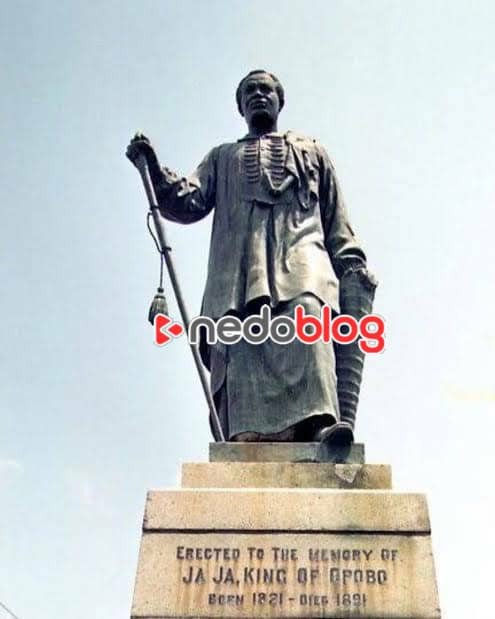views
Early life (c. 1821 → Bonny)
Birth & origins: Born around 1821 in Umuduruoha, Amaigbo (present-day Imo State, Nigeria). He was Igbo by origin. His names appear in records as Jubo Jubogha and (in some scholarship) Ozurumba Mbanaso. As a boy he was kidnapped and sold into slavery, ending up in the Niger Delta trading city of Bonny.
Rise in Bonny: Through intelligence and grit he earned freedom and rose within Bonny’s merchant “houses,” eventually leading the Annie (Annan/Annie) Pepple House, one of two dominant trading blocs (the rival was Manilla Pepple House, associated with Oko Jumbo).
Break with Bonny & the founding of Opobo (1869–1870)
Bonny civil war: Tensions over control of the palm-oil trade erupted in 1869. Jaja led his faction out after defeat/stalemate and founded Opobo (often spelled Okpobo) on new sites east of Bonny, along Andoni/Imo River creeks. He was crowned Amanyanabo (king) of Opobo on December 25, 1870.
A commercial power: Opobo quickly became a premier palm-oil port. Jaja blocked middlemen, insisted European merchants deal directly at Opobo, and by 1870s was exporting thousands of tons of palm oil to Liverpool. He kept missionaries out, opened a secular school, and sent his children to schools in Glasgow—a blend of conservatism and pragmatism designed to defend Opobo’s trading position.
Treaty backdrop: After a Bonny–Opobo peace in 1873, Jaja relied on earlier understandings with British consuls to control upriver trade above “Hippopotamus Creek”—a point he would later cite when merchants tried to bypass Opobo to reach inland markets.
Scramble for Africa pressure (1884–1887)
Protectorate era begins: During the Berlin Conference (1884–85), the Niger Delta fell under declared British protection. British traders—with consular backing—pressed for “freedom of navigation and trade.” Jaja resisted, maintaining Opobo’s right to regulate who traded in its waters and markets.
Consul Johnston’s move: In 1887, British Vice-Consul Henry (Harry) Hamilton Johnston invited Jaja to “negotiate” aboard a Royal Navy vessel (commonly identified as HMS Goshawk). Once aboard, Jaja was arrested on charges tied to obstructing trade and taxing British merchants. He was taken to Accra (Gold Coast) for an inquiry.
The Accra inquiry & exile (1887–1891)
Who tried him: The inquiry was conducted in Accra in December 1887 by Rear-Admiral Sir Walter Hunt-Grubbe, Commander-in-Chief of the West Africa Station. Contemporary and modern analyses argue the proceedings were stacked against Jaja and ignored arbitration clauses in earlier treaties. Verdict: exile.
Where exiled: Jaja was sent first to London, then to St. Vincent and Barbados in the British West Indies. His presence drew sympathy among Afro-Caribbean communities who saw him as a wronged African king.
Death en route home (1891)
After petitioning for years, Jaja was granted permission to return in 1891. He left the Caribbean, but died at Tenerife (Canary Islands) on July 7, 1891, before reaching home. Rumors later claimed poisoning (e.g., “a cup of tea”), but the established fact is his death at Tenerife during the journey. His remains were returned to Opobo.
Governance, ideas & economy (what he built)
Political style: Jaja fused Niger Delta house-system politics with state-building—centralizing authority in the king and using commercial leverage to bind hinterland producers to Opobo markets. He negotiated hard with Europeans, taxed trade, and forbade foreign factories upriver (to keep price control).
Education & culture: He financed schooling but barred missionaries, concerned they would undermine authority and commercial strategy. He employed European staff at his school and embraced selective modernization that served Opobo’s autonomy.
Foreign relations: He concluded local peace deals (e.g., 1873 Bonny–Opobo) and signed a protectorate treaty (1884) under terms he believed preserved Opobo’s internal commercial control—an interpretation later overridden by consular rulings in favor of British traders.
Why he clashed with Britain (in one line)
Jaja tried to protect a local monopoly system that had made the Delta houses rich; Britain, post-Berlin, pushed free access for its merchants. The collision ended with gunboat diplomacy, an extraterritorial inquiry, and exile.
Legacy & memory
Local memory: Opobo (today in Rivers State) remembers him as founder-king and a symbol of economic self-determination. A memorial statue (1903) stands in Opobo town.
African & diaspora history: Jaja’s story—from enslaved boy to merchant-king—is a touchstone in studies of the Niger Delta, the palm-oil economy, and resistance to colonial encroachment.
---
Quick timeline
c. 1821: Born at Umuduruoha, Amaigbo (Igbo). Kidnapped and sold to Bonny.
1869: Bonny civil war; Jaja leads his faction out.
Dec 25, 1870: Crowned King (Amanyanabo) of Opobo.
1873: Peace with Bonny; Jaja asserts control over upriver trade routes.
1884–85: Protectorate/“free trade” claims after Berlin Conference intensify pressure on Opobo.
Sept 1887: Vice-Consul Harry Johnston lures and arrests Jaja; he’s sent to Accra.
Dec 1887: Rear-Adm. Hunt-Grubbe inquiry in Accra—exile ordered.
1888–1891: Exile in St. Vincent & Barbados (via London).
July 7, 1891: Dies at Tenerife en route home; body later returned to Opobo.





















Comments
0 comment